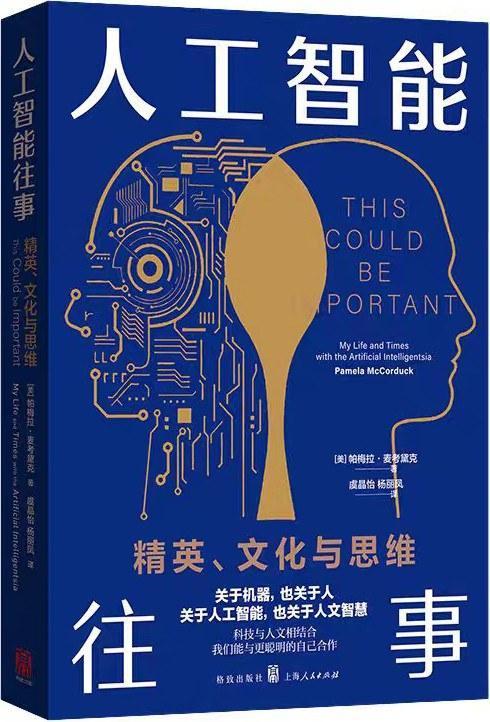Artificial intelligence has developed rapidly in recent years, and related software and products have gradually entered the public eye. While people feel that artificial intelligence has brought exponential changes to their lives, they also hope to have further thinking about artificial intelligence: What does it mean to human beings?
As a witness to the development of artificial intelligence, Pamela McCordeck tried to answer this question in her memoir "Once Upon a Time in Artificial Intelligence".

As a popular science writer, Pamela has been paying attention to the development of this field since the emergence of the concept of artificial intelligence and has maintained friendships with many related scientists. In the process of interacting with these key figures in the field of artificial intelligence, she found that artificial intelligence derived from science did not go against the opposite of humanities. On the contrary, it actively embraced human thinking and reflected the ideological value of human beings as the main body.
On the road of exploring artificial intelligence, Pamela writes scientific stories with a humanistic touch. She seriously thinks about the process of "inheriting ideas and character personalities" of artificial intelligence, hoping to build "two kinds of humanistic culture and scientific culture" through each story. "Bridge between Cultures", trying to mediate the opposition and conflict between two cultures.
Obviously, Pamela is optimistic about the development of artificial intelligence, but this optimism is not unlimited. She believes that in the process of technological development, personal information tracking, the proliferation of false information, and biases in manual systems have revealed long-term disadvantages, and they all need to be taken seriously. However, she disagrees with the fear of some humanities scholars in the face of artificial intelligence, calling it “Dionysian fear.”
Of course, the psychology she mentioned is not unreasonable.
The German philosopher Herbert Marcuse pointed out in "One-Dimensional Man: A Study of the Ideology of Developed Industrial Society": "Science and technology under the guidance of rationality improve the efficiency of human material production, but also make human beings unfree. The state has been rationalized. "People's over-reliance and blind pursuit of science and technology have caused unfreedom that was originally unacceptable and tolerated to be taken for granted due to scientific and technological progress and the development of civilization.
People subject to this framework may actually be "enslaved" by technology, forced to repeat monotonous and mechanical labor. Over time, creativity and labor break apart, passion waves goodbye to life, and people eventually become parts on the production line. As a result, the technology that promotes the development of human civilization has become a tool for "alienation". And who can really foresee now whether artificial intelligence will become a new round of shackles to "enslave" people?
According to the German philosopher Martin Heidegger, the essence of technology is a way of "unconcealing". Artificial intelligence, like many science and technologies, gives modern people a convenient way to understand themselves and the world. It is also a way of "de-concealing". Through artificial intelligence, people can obtain a large amount of information in a short period of time and analyze it to understand unknown things. However, people may also lose other ways of understanding things due to over-reliance on artificial intelligence. At this time, "uncovering" has become another kind of "covering".
Pamela is certainly aware of this, so she believes that, in fact, the resistance of humanities scholars to artificial intelligence is essentially a manifestation of "self-protection", an alertness to unknown risks, and a continuous desire for truth exploration. As for some remarks such as "artificial intelligence will cause the Holocaust", in her opinion, it seems a bit "reckless and even emotional."
But she also mentioned that this just shows that in the face of increasingly mature artificial intelligence, we humans should face up to the problems caused by its development and keep a clear mind, refusing to become a vassal of artificial intelligence; we should use artificial intelligence to improve efficiency while , never forgetting the uniqueness of human beings, and constantly thinking and exploring.
So, my understanding is that artificial intelligence technology itself does not have human-like thinking, which means that artificial intelligence’s thinking is only based on designed codes. Therefore, the subject of artificial intelligence is ultimately humans, not machines. How about artificial intelligence? Development and how to use it should also depend on people. Furthermore, the purpose of artificial intelligence is to serve and assist people.
In recent years, artificial intelligence has played an increasingly prominent role in the construction of ecological civilization, and it can be seen in ecological protection, ecological restoration, ecological early warning, etc. If humans know how to coexist harmoniously with nature and eliminate centralism, they will naturally also know how to cooperate with artificial intelligence. As Pamela pointed out, artificial intelligence can become a mirror for humans to examine themselves, and will also lead humans to a more suitable position in the world.